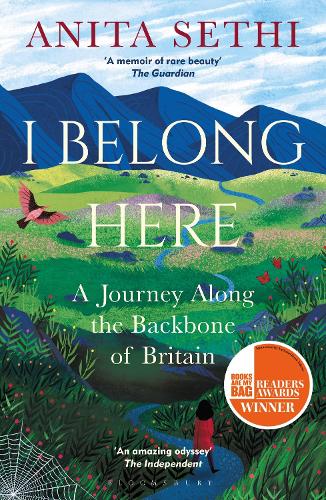
I Belong Here by Anita Sethi.
Anita Sethi’s book is an exploration of belonging in the country, in the land and in the self. Following a race hate crime, where, among other things I won’t repeat, she was told to ‘go back to where you’re from’, she decides to walk the North, parts of the Pennine Way up to Hadrian’s Wall to walk herself into belonging.
“It is walking that is giving me perspective; walking through this landscape frees my mind to reflect on my place in the world and on how deep systemic unbelonging is.”
Belonging in the country
A friend of mine once described her heritage as ‘entirely a product of empire’ and so is the writer of this book. She was born in Manchester to parents of Asian origin, neither of whom was born in Asia. Her parents were both descendants of the generations of people from the Indian subcontinent who were forcibly moved to places in Africa and the Caribbean to serve the British empire as indentured labour. She is a product of British history.
The white man who told her to go back to where she came from is also a product of British history. His white supremacist mindset both underlies, and continues to be the consequence of, the actions of generations of British people across the globe. Does he belong? Who gets to decide? What are the rules which stipulate who can stay and who cannot?
“Protected characteristics should be taught at the earliest age, young people learning that it is not only wrong but illegal to abuse someone’s identity, the core of who they are. […] people should not have to wear signs saying that aspects of them are protected. Respect of others should be ingrained as basic civility.”
As a white liberal I would rather spend time with the brown-skinned woman who treats people with respect than the white-skinned man who commits hate crime. However, they represent facets of the same history and as another facet of that same history, it feels important that I have empathy for both.
Belonging in the land
“As I walk I let my journey so far flow through my mind, and my body seems to merge with the body of the landscape.”
As the writer walks the hills and valleys of the Pennines, she becomes aware of herself simply as a human being, a part of nature’s biodiversity. On the land as in society, there are those who are dominant and those who are persecuted. Species have migrated, some for short periods, others for long enough to be considered ‘indigenous’. She explores natural features whose timeline is so enormous it makes the fluctuations of animal populations miniscule by comparison.
“Thinking about such deep time all around draws me out of my loneliness, as I feel how fleeting a human life is, how miraculous that mine has for these moments crossed paths with such astonishing lifeforms, which provide a kind of companionship.”
This gives her a sense of peace and acknowledgement. It also gives her a sense of kinship with persecuted animals, threatened by the actions of those who have given themselves the right to determine who belongs.
“Considering human and biodiversity throughout my journey is showing how people and place as inextricably connected, how we must care both for the earth and for each other.”
Belonging in the self
“Imposter syndrome is imposed from without, in multiple macro and microaggressions of prejudice.”
What can we learn about this experience of belonging? What is it that makes up this sense of belonging? Is it having roots by virtue of history? Is it finding kinship, being among your own kind? The word ‘safety’ comes up frequently. What makes up the safety? Is it safety from harm, from an enemy? Safety within and only within….? I would guess that the man who shouted was at some level feeling unsafe within himself and within his own community and he thought if we could evict all brown-skinned people then we could go back to some halcyon time when he believed that he would feel safe.
How do we choose to feel safe in a world of uncertainty and forced migration and climate chaos? Wherever possible we must not make belonging contingent on external factors. Belonging is something that you can choose for yourself. It is a state of mind.
“Forgiveness is not to condone the fault in behaviour. Forgiveness is to see the ignorance at its root, to not let the feelings of hurt and anger corrode us, to be able to walk on and move forward. There is strength in forgiveness, a deepening of empathy, extending empathy even to so-called ‘enemies’ or those who have hurt us.”
Anita Sethi has chosen to write herself into belonging. It is when she is writing her story that she constructs for herself a safe place to belong.
“To anyone who feels like they don’t belong, I say: build a sense of belonging in your own mind, body, and in nature, a sense of belonging that no one can take from you. Learn to inhabit yourself.”


